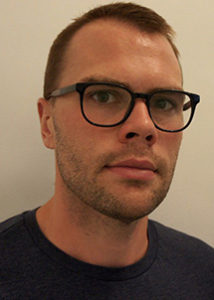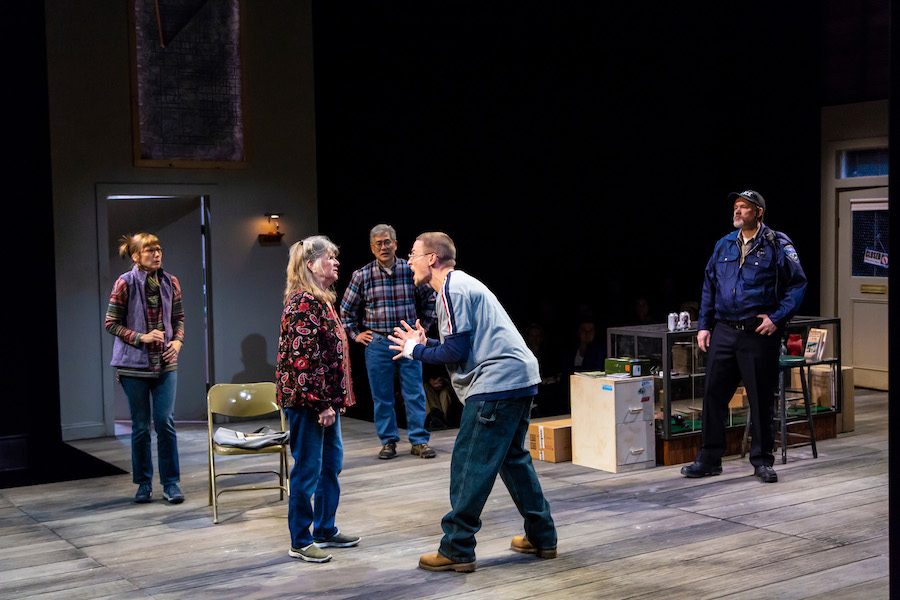In Samuel D. Hunter’s Greater Clements, Maggie and Joe, a mother and son who run an Idaho mining museum, face its imminent closure as their small town goes through the process of unincorporating. When an old flame of Maggie’s turns up, her chance for a new start runs head on into punishing compromises and existential questions. The complete text of the play appears in our May/June issue. Tony Kushner spoke to Hunter about the play.

TONY KUSHNER: I want to start by talking about Idaho. Your work seems to involve a very strong sense of place. I have sort of an adjacent question, which is whether or not your plays are interconnected. Are they in some ways a cycle?
SAM HUNTER: I think so? But in many ways I’m still figuring that out because I’m still building it. When I first decided I wanted to be a playwright, I was a high school student in Idaho. I only applied to two colleges—the University of Idaho and NYU—because somebody told me that you taught there, which I wasn’t even sure was true.
I did for like three years.
When I got to New York, I was so overwhelmed. I mean, all I knew about New York was from reading Allen Ginsberg, who I was obsessed with when I was a teenager, and Angels in America, which I saw at the University of Idaho in 1999. I started writing plays set in Idaho as a kind of “write what you know” sort of thing. I have fairly deep roots there—my great-great grandfather was the first postmaster in my hometown, having moved there right after he fought in the Civil War. So I feel deeply connected to that part of the country. In school, I also wrote plays set elsewhere, but the Idaho ones always kind of hit firmer ground for me emotionally.
Then, at a certain point, around 2012, 2013, when I was first starting to get produced, I was like—Oh, this isn’t about any one play; this is about a body of work. And within that body of work, I want the plays to respond to and dovetail off each other. I have no idea what this project is going to look like going forward, but I haven’t grown tired of it yet. And it’s not like I start every play saying, “Gotta write about Idaho!” It’s just that the stories and the people I want to write about naturally fit into that landscape. And maybe also because I don’t see a lot of people like that populating our stages and our screens.
You’ve found a way to investigate everything that’s central to what we’re going through now as a country in these locations. In these small towns in Idaho, there’s the terribly powerful presence of economic disparity and despair—the things everybody talks about every election cycle, people who are living in towns that have lost their economic reason for being. Was that true at the time that you were growing up there?
Actually, no. I grew up in Moscow, a college town in Northern Idaho, which is honestly the reason I was able to imagine becoming something so esoteric as a playwright. I grew up with access to the University of Idaho Library, the largest library in the state, where I was introduced to writers like Allen Ginsberg. If I had lived in a town like where my mom grew up—Weiser, Idaho—I probably wouldn’t have had the same kind of access. Even though Moscow is a small town in Northern Idaho that takes 15 hours to get to from New York City, there’s still a window to the larger culture. Which is probably why I don’t often set plays in my hometown, because it doesn’t feel like the majority of Idaho to me.
It was a surprise in Greater Clements to learn—I didn’t know this, I’m embarrassed to say, and I went home and Googled it—that there were internment camps in Idaho, and there had been a Japanese American community in the state, and racial tensions both before the war and when vets from the Pacific theatre were returning home.
I should credit my mother with that. I was looking through one of her old yearbooks a few years ago, and I was struck by the fact that there were a ton of Japanese American kids in her high school in rural Idaho. Turns out, there had been an internment camp nearby, something my mother was only vaguely aware of when she was young. She went on to tell me that she had dated a Japanese American classmate, as had her sister. My grandfather was a World War II vet, and, at a certain point, he told them that he didn’t approve of it.
Was that something that you grew up knowing about?
No, I didn’t know until very recently. Which itself reveals so much about who we are as a country and what we choose to remember. I had wanted to work that idea into a play for years, but I didn’t really know how. But when the 2016 election happened, that piece of history took on a new dimension. I think Greater Clements is maybe the first time I’ve ever set out to write a play that’s a state-of-the-nation kind of play.
What do you mean by that?
Well, even though I think my plays kind of intersect with political ideas, I don’t really think of them as overtly political plays. But I wrote the first draft of Greater Clements about a month after the election in a writers’ group at the Lark. I was feeling so much anxiety, and I had so many questions; I think the play was, to a degree, my way of dealing with my own stress and dread. But the element that locked it into place, that really made it an allegorical state-of-the-nation tragedy, was the idea of a town voting to unincorporate. And this is an actual phenomenon. The real-life town I sort of modeled Clements on was called Seneca, Neb. that voted to unincorporate because of issues within and between the community—arguments over land use, things like that. Unincorporating opened up a fissure in the community. I was interested in the idea that these small little cracks give way to these larger conflicts and deeper wells of resentment.
Something I’ve seen in a number of your plays is that you have a great trust in the dramatic form itself to tell truths that you don’t have to speak—you know, the characters don’t have to stand up and deliver an essay.
Yeah, that’s right. I don’t have a lot of rules for myself as a writer, but it is important to me that the characters aren’t mouthpieces for ideas. That doesn’t mean that there aren’t big monologues in Greater Clements. But I think the plays are trying to engage with on-the-ground human outcomes of these ideas and these realities. So the language they traffic in should be more quotidian and honest, you know what I mean?
Yeah. I mean, they do and they don’t, because the deeper you get into one of your plays when you’re watching it or when you’re reading it, you train yourself to listen. The language feels to me, as a New Yorker who I think was once in Idaho, like not exactly a regional dialect, but kind of a rhythm of speech that’s true to that area.
It’s funny, I’ve thought about this a lot. I do think that there’s a particular Idaho sensibility, which is a bit held back and a little terse. That being said, at this point I might have just developed a kind of dialogue that’s more specific to the plays I’ve been writing rather than the real Idaho. It’s kind of a constant dance for me, given that I write about a real place: How much do I try to make sure that I’m “accurate” about the real place versus allowing myself to freely create these fictional characters and situations?
It seems to me, more than Lewiston and Clarkston, more than The Harvest, that this is a tragedy, and that it came out of this catastrophic moment in recent history, the election of Trump. If there’s hope in Greater Clements, it seems to me it’s primarily in the absolute blasting away of everything that is.
Yeah. Around when I was first conceiving the play, I remember walking downtown and having the idea for the last three scenes. And I was like—Whoa, that’s not usually the place where I go in my plays. But then I thought: maybe this is a full-blown tragedy. And ultimately that’s why the play has a structure that’s itself sort of a callback. The play is so much about the toxicity of nostalgia, and how we desperately try to relive things without admitting what they really were. You see that, for instance, when Billy’s character opens up about what it was like to be a Japanese American person in the ’60s in a small town in Idaho. Maggie follows up with something like, “Well, but it was still a great place to grow up, right?” She’s trying to move the truth to the side, not in an act of malevolence, but just sort of, like, “I can’t believe that about my lovely town.”
When this is played out on a larger scale, we get a culture where people keep saying that the America of yesteryear was idyllic and wonderful. So I thought, okay, let me employ this dramatic structure from the first half of the 20th century, sort of a nostalgic structure in and of itself. But then toward the end, that structure itself intentionally starts to fall apart.
The great sin, the great crime, in the play is a completely human level of ambivalence. It’s a world so stretched toward extremes, where there’s so little comfort or luxury or forgiveness, that even ordinary, inescapable human qualities become possible sources of unspeakable tragedy. It’s cruel, but tragedy is cruel because life is cruel.
Yeah. With this play I just really allowed myself to go to that—this is going to sound so pretentious—almost Greek place. The high tragedy place. But I will say that the new play I’m working on now feels like a spiritual response to Greater Clements. It’s looking toward the future, looking past the tragedy, wondering what comes after that great flood.
Greater Clements, by Samuel D. Hunter; direction: Davis McCallum; lighting design: Yi Zhao; costume design: Kaye Voice; scenic design: Dane Laffrey; and sound design: Fitz Patton.




